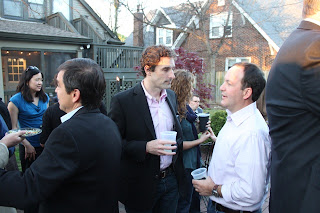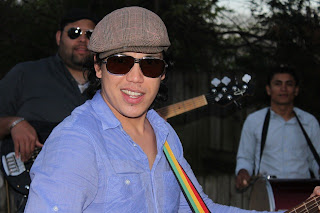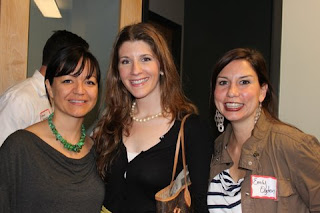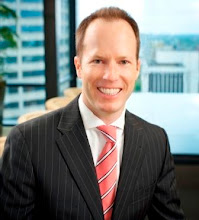On January 31, 2011, I sat down to talk with Scott Witherow, owner of Olive and Sinclair Chocolate Co. , which makes the South's best chocolate.
 |
| Olive & Sinclair's Exclusive with Williams-Sonoma |
Later that night, he hosted WaterCooler, a monthly networking event for young entrepreneurs that some friends and I co-founded in August 2009. We had a jam-packed crowd of over 40 people. Everyone, it seems, wants to learn more about this company. (For another great write-up on the tasting, check out the recent post on Nashville Foodies' blog, or see Gwyneth Paltrow's blog "Goop," which highlighted O&S.)
Begun just 13 months ago in September 2009, Olive and Sinclair’s growth has been as viral as a posting on Facebook or Twitter. O&S has already gained an exclusive contract with Williams-Sonoma for some of its products, and the demand for its chocolate grows every day.
We met after work at the office of O&S, which doubles as factory, research and design center, marketing headquarters, and nerve-center for all things chocolate in Nashville. Before everyone from WaterCooler arrived, Scott offered me a sneak-preview sample of an upcoming chocolate he plans to launch in the coming weeks, something he’s collaborating on with Benton’s Smoky Mountain Country Hams. To top it off, he offered me the perfect pairing of a Terrapin Moo Hoo Chocolate Milk Stout, which also has O&S chocolate in it. Talk about a rich combination. This was better than any of the after-school snacks I ate as a kid!
Here’s my take-away from talking with Scott, and what I think are some of the biggest secrets of his success. To be honest, I think these are some of the best keys to any modern business’s prosperity:
1. Authenticity: Olive & Sinclair offers an authentic story and product.
2. Collaboration: O&S collaborates with Terrapin, Drew’s Brews, Williams Sonoma, Bongo Java, and even non-profits like Saddle Up.
3. Embracing Social Media: Scott told me they couldn’t have had this massive growth and success without using social media. Only a 13 month old company, O&S has already grown to over 500 retail and wholesale customers.
 |
O&S Red Hot Hearts for Valentine's Day |
Here’s the best parts of my conversation with Scott:
Zralek: Thank you for the Terrapin Moo Hoo Chocolate Milk Stout…awesome! You were saying that social media has without questions helped your business…tell me how.
Witherow: Obviously it allows us to communicate with anybody out there that’s interested in Oliver & Sinclair. But because we’ve also been blessed with some pretty ridiculous—in a good way—articles. It’s allowed for people to actually kind of let us have a face. We were doing a lot more on Facebook and blogging before we ever even had a website. So that was a big part of it.
ZRALEK: Part of what I find in my work representing businesses as a lawyer is that, when people who are older than us (both in our 30s) are running companies, they often question the value of social media.
WITHEROW: Yeah.
ZRALEK: And to me, companies like yours are a prime example of how social media can help fuel the explosive growth you’ve experienced.
WITHEROW: I think for me and the company, I think that we all just believe in this product. We’re not…we don’t necessarily get into chocolate as like a monetary thing, you know, to make like a bazillion dollars. So it started off with just kind of loving the idea of being able to make chocolate. And then for me it was—I want to make chocolate personable and…I don’t know what this sounds like. But I think that we were successful in making it approachable and, again I don’t mean it arrogantly, but I think we do make a good product, and I think that social media is hugely important as long as you have a good product.
ZRALEK: I agree.
WITHEROW: But I think…
ZRALEK: If you’ve got nothing behind it, it doesn’t matter.
WITHEROW: Yeah, if it’s all this kind of chutes and ladders then you’re only going to go so far with it. But I think that—it’s been great even getting feedback, good and bad. I mean there have been people that have shot me a message on Facebook saying something was up or they noticed something and, like we had one customer who got a chocolate bar that wasn’t up to their standards of what they thought O&S was. And so she Facebooked me and, with the a batch number that we include on every bar, we found out where she bought it. It was poor product placement and it was such an old bar…I mean such an old bar that it shouldn’t have been on the shelf. So we had to go in and make sure that they were off the shelf and that our batch numbers are—they’re done for a reason. So that’s a great part to me.
ZRALEK: So this beer that you’re letting me taste, what’s the best chocolate that goes with it?
WITHEROW: [Handing me a sample of an upcoming release where O&S is collaborating with Benton’s Hams.] It will be a little while before it’s out.
ZRALEK: So what is that that I just tasted?
WITHEROW: It’s a smoked nib.
ZRALEK: From Benton’s Farm…they’re teaming with you?
WITHEROW: Yeah, we’re kind of teaming up for a little project. Hopefully we’ll see it through.
ZRALEK: And what’s that made of…it’s so good. Is there some bacon in there?
WITHEROW: No, [it’s just] nibs [that] are smoked by Alan down in Madisonville.
ZRALEK: So it’s more of the smoked flavor than the bacon.
WITHEROW: Yeah, there is no bacon in there really because it’s just…it’s Alan good quality smoked [flavor]…
ZRALEK: Wow it tastes good. . . .
 |
Tasting of Various O&S Chocolate |
ZRALEK: [W]hen did you decide to start this [company]?
WITHEROW: That was somewhere 2008 sometime, I think.
ZRALEK: What were you doing before Oliver & Sinclair?
WITHEROW: Just working in kitchens here in town. At the time I was a pastry chef at
F. Scott’s.
ZRALEK: I didn’t know that.
WITHEROW: Yeah, I was there for about three years
ZRALEK: Did you go to culinary school somewhere?
WITHEROW: Yeah I went to
Le Cordon Bleu.
ZRALEK: So you don’t recommend just anybody deciding to start their own chocolate shop? Having a little training comes in handy?
WITHEROW: Yeah but I didn’t learn how to make chocolate in culinary school. They didn’t guarantee me that. It’s more of working with chocolate. And I always try telling people it’s kind of like people that really like craft beers tend to start home brewing at some point. And I worked a lot with chocolate so I learned how to make my own chocolate. And I just started doing it.
ZRALEK: Where did you sell to first? Who was your first buyer?
WITHEROW: Mitchell’s Deli. [Mitchell’s, the best deli in Nashville, is literally upstairs from Olive and Sinclair.]
ZRALEK: Are you selling primarily in Middle Tennessee?
WITHEROW: No, we’re nationwide and in Canada.
ZRALEK: So you started in ’08, it’s now January 2011…
WITHEROW: Well, I say we started in ’08. I started experimenting in ’08 and making test batches.
ZRALEK: So when was your first sale?
WITHEROW: September of 2009.
ZRALEK: Wow. You’re a young company.
WITHEROW: Yeah. We’re a year and three months.
ZRALEK: That’s great. . . .
ZRALEK: [O]bviously you wear a lot of hats. I assume that you [serve as] creative director, HR director, CEO, chief culinary designer and are you also making house calls to these places or do you send somebody else out there for you?
WITHEROW: We don’t call on anybody. We don’t approach someone in hopes that they’ll sell our chocolate. Maybe the first two months some of that went on, maybe three, probably two. But we really tried to slow down after that. We did some here and there during brief interims where we kind of thought it was getting quiet and you start to get kind of nervous as a new company or whatever. And you think well we need to pick up the phone and start cold-calling. But I think that we’ve all really found that just holding tight and just getting the product out there and in other ways. Yeah, that’s kind of how we do it.
ZRALEK: Let me ask you who you’ve teamed up with in terms of making chocolate. So you’ve teamed up with Benton’s Hams.
WITHEROW: Yeah, with Alan. And that’s a new something.
ZRALEK: So that’s on its way. Who else have you teamed up with if anybody?
WITHEROW: Well we teamed up with Terrapin, you know, for the Moo Hoo. And we look at all the local guys. I called the
Yazoo boys [Linus Hall and his team] and made sure that [they didn’t mind] cause they’re the home team, so…
ZRALEK: Have you done anything with a coffee company yet?
WITHEROW: Yeah, we do stuff with Bob Bernstein [at
Bongo Java] in our normal coffee line. And then we do a line that’s exclusively at Williams-Sonoma [and one] that we do with my buddy Drew [of
Drew’s Brew’s]. And it’s a totally different chocolate and a totally different roasted coffee. So it’s kind of a new interpretation of that.
ZRALEK: Okay, one last question…
WITHEROW: Yazoo as well. I gotta say we have teamed up with Yazoo…
ZRALEK: …and you’re drinking Yazoo as we’re talking.
WITHEROW: Yeah.
ZRALEK: So a good loyal follower.
WITHEROW: Yeah, I’m a big fan.
ZRALEK: Who do you see as your main competitor and who do you see—that’s probably a bad term—but who do you see as…is there any other chocolatier in the US that you think does a really good job like you do?
WITHEROW: I don’t want to look at them as competition. I guess in a way I kind of have to. But…
ZRALEK: Who else is a local chocolatier that you like?
WITHEROW: Well, just to…we’re not really chocolatiers. We don’t make truffles, we don’t…
ZRALEK: Chocolate company…what’s the right word?
WITHEROW: We’re chocolate makers. We import beans [then roast them and temper them].
ZRALEK: So who else does it like you do?
WITHEROW: Nobody in Tennessee.
 |
Imported Cocoa Beans at O&S |
***********************************
Copyright Stephen J. Zralek 2011
©. All Rights Reserved.



















































